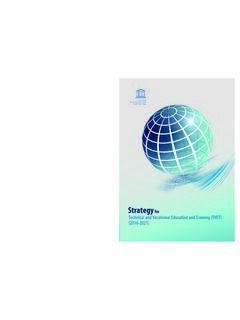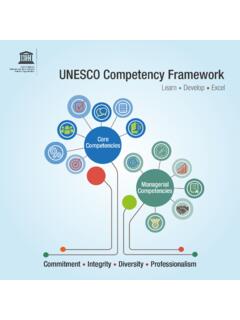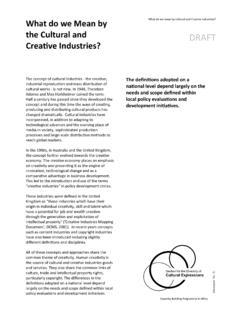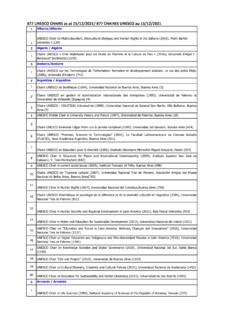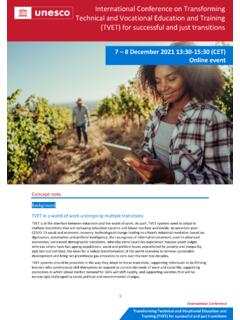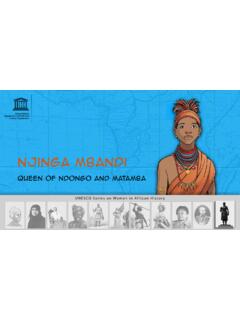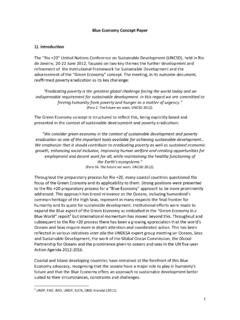Transcription of Berlin Declaration on Education for Sustainable Development
1 Berlin Declaration on Education for Sustainable Development Preamble , participants from governments, international, intergovernmental and non- governmental organizations, civil society, youth, the academic community, the businesssector and all spheres of teaching and learning, convened online from 17 to 19 May 2021for the World Conference on Education for Sustainable Development , organized byUNESCO in cooperation with the Federal Ministry of Education and Research of Germany,and with the German Commission for UNESCO as advisory partner, adopt this are convinced that urgent action is needed to address the dramatic interrelatedchallenges the world is facing, in particular, the climate crisis, mass loss of biodiversity ,pollution, pandemic diseases, extreme poverty and inequalities, violent conflicts, and otherenvironmental, social and economic crises that endanger life on our planet.
2 We believe thatthe urgency of these challenges, exacerbated by the Covid-19 pandemic, requires afundamental transformation that sets us on the path of Sustainable Development based onmore just, inclusive, caring and peaceful relationships with each other and with are confident that Education is a powerful enabler of positive change of mindsets andworldviews and that it can support the integration of all dimensions of sustainabledevelopment, of economy, society and the environment, ensuring that developmenttrajectories are not exclusively orientated towards economic growth to the detriment ofthe planet, but towards the well-being of all within planetary are confident that Education for Sustainable Development (ESD), anchored in SDG as an enabler for all 17 SDGs, is the foundation for the required transformation,providing everyone with the knowledge, skills, values and attitudes to become changeagents for Sustainable Development .
3 ESD enables learners to develop their cognitive andnon-cognitive skills, such as critical thinking and competences for collaboration, problemsolving, coping with complexity and risk, building resilience, thinking systemically andcreatively, and empowering them to take responsible action as citizens, fulfilling their rightto quality Education as defined in SDG 4 - Education 2030. We believe that ESD must bebased on and promote respect for nature, as well as human rights, democracy, the rule oflaw, non-discrimination, equity and gender equality. In addition, it should promoteintercultural understanding, cultural diversity, a culture of peace and non-violence,inclusion and the notion of responsible and active global welcome the new ESD for 2030 framework and its Roadmap for implementation asour guiding documents for the next 10 years to mobilize action on ESD in the areas of policy,transforming learning environments, capacity Development of educators, youthempowerment, and local level commitment , within our respective mandates and in our areas of responsibility.
4 Taking into accountour needs, capacities, available resources and national priorities, commit to the following:a)Ensure that ESD is a foundational element of our Education systems at all levels, withenvironmental and climate action as a core curriculum component, while maintaining aholistic perspective on ESD that recognizes the interrelatedness of all dimensions ofsustainable Development ;b)Integrate ESD into all levels of Education and training from early childhood to tertiary andadult Education , including technical and vocational Education and training (TVET), and intonon-formal Education and informal learning, so that all individuals are provided withlifelong and life-wide learning opportunities for Sustainable Development .
5 C)Implement ESD with joint emphasis on the cognitive skills, social and emotional learning,and action competences for the individual and societal dimensions of transformation,promoting individual behavioural change for Sustainable Development , equality andrespect for human rights as well as fundamental structural and cultural changes at thesystemic level of economies and societies, and also promoting the required politicalaction to bring about these changes;d) Harness the power of ESD for the redesign of our societies, encouraging, inter alia, accessto scientific knowledge and data sharing to facilitate research, evidence-based policies,democratic decision-making and the recognition of indigenous knowledge, to promotesustainable and transformative economies centered on respect for the well- being ofpeople as well as for the planet, and to enhance resilience and preparedness for futureglobal crises.
6 E)Promote a whole-institution approach, recognizing that learners and the schoolcommunity become meaningfully engaged in Sustainable Development throughdemocratic participation when their institutions become living laboratories forparticipation and active citizenship, equity and gender equality, health, connections withnature and respect for the environment, energy efficiency and Sustainable consumption,and where learning is experiential, action-oriented, localized and culturally specific,allowing learners to learn what they live and live what they learn;f)Recognize climate change as a priority area of ESD of particular importance to Small IslandDeveloping States (SIDS), as they require special attention in terms of ESDimplementation due to their increasing vulnerability to climate change and naturalhazards.
7 G)Also recognize the crucial role of teachers to promote ESD and invest in the capacitydevelopment of teachers and other Education personnel at all levels and to ensure awhole-of-sector approach to the necessary transformation of Education ;h)Harness the potential of new, digital and green technologies to ensure that the access, Development and use of technologies is responsible, safe, equitable, inclusive and basedon critical thinking and sustainability principles with a proper assessment of risks andbenefits, as well as promotes open educational resources, open science and affordableeLearning facilities for ESD.
8 I)Empower young people as change agents for Sustainable Development , by creatingopportunities for learning and civic engagement, and providing them with thecompetencies and tools to participate in ESD as co-creators of individual and societaltransformation;j)Prioritize marginalized populations, including persons with disabilities, refugees andpersons affected by conflict, crises and natural disasters, through an inclusive approachby promoting innovative ESD policies which are contextualized and embedding ESD inemergency Education ;k)Emphasize gender equality and non-discrimination in access to knowledge and skills, andensure gender mainstreaming in ESD which enables a more profound and holisticunderstanding of sustainability challenges and potential solutions;l)Mobilize ESD to combat poverty, particularly extreme poverty, and provide learners withrelevant competencies to meet individual and societal demands, including through TVETand skills Development for Sustainable livelihoods to ensure human dignity and the rightto live decently.
9 M)Enhance multi-sectoral and multi-disciplinary collaboration on ESD at all levels ofgovernance, with Ministries of Education collaborating with all other Ministries that havean impact on Sustainable Development , to ensure a whole-of-government approach, withstrengthened cooperation between Ministries of Education and Environment at the core,as well as with all other relevant stakeholder groups, such as non-governmentalorganizations, the academic community, the business sector, youth, and others;n)Support the further alignment, at global, regional and national levels, of the Education ,environment, climate, Sustainable economy and other relevant Development agendas,and enhance networking between different stakeholder groups in order to ensure thatefforts are mutually supportive and complementary and support structural mainstreamingof ESD.
10 O)Allocate sufficient resources and protect the domestic and international financing of ESDat the time of Covid-19 and beyond, and emphasize the role international developmentcooperation plays in promoting quality Education and youth empowerment in developingcountries in ways that strengthen the power of Education in making all societies more justand Sustainable ;p)Monitor ESD progress, in the context of the overall monitoring of the SDGs and in particular, in order to ensure that implementation is continuously improved andhelps ensure that
